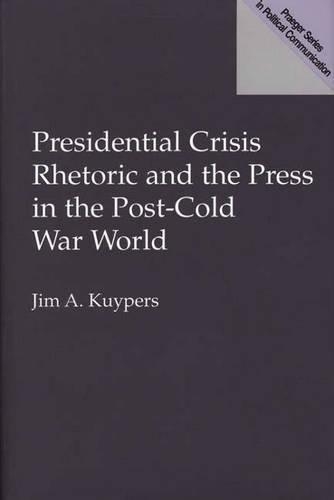
Presidential Crisis Rhetoric and the Press in the Post-Cold War World
(Hardback)
Publishing Details
Presidential Crisis Rhetoric and the Press in the Post-Cold War World
By (Author) Jim A. Kuypers
Bloomsbury Publishing PLC
Praeger Publishers Inc
26th August 1997
United States
Classifications
Tertiary Education
Non Fiction
International relations
Communication studies
News media and journalism
327.73
Physical Properties
Hardback
264
Description
Kuypers combines rhetorical theory and framing analysis in an examination of the interaction of the press and the president during international crisis situations in the post-Cold War world. Three crises are examined: Bosnia, Haiti, and the North Korean nuclear capability issue. Kuypers effectively demonstrates the changed nature of presidential crisis rhetoric since the end of the Cold War. Kuypers employs a new historical/critical approach to analyze both the press and the Clinton administration's handling of three international crisis situations. Using case studies of Bosnia, Haiti, and the alleged North Korean nuclear buildup in 1993, he examines contemporary presidential crisis communication and the agenda-setting and agenda-extension functions of the press. The importance of this study lies in its timeliness; President Clinton is the first atomic-age president not to have the Cold War meta-narrative to use in legitimating international crises. Prior studies in presidential crisis rhetoric found that the president received broad and consistent support during times of crisis. Kuypers found that the press often advanced an oppositional frame to that used by the Clinton administration. The press frames were found to limit the options of the President, even when the press supported a particular presidential strategy. This is a major study that will be of interest to scholars and researchers of the press, the modern presidency, and American foreign policy.
Reviews
"This volume provides the first in-depth analysis of how American presidents are struggling to create a post-Cold War foreign policy rhetoric. The mixed results of that emerging rhetoric reflect both the rhetorical limitations of recent presidents and the incredible rhetorical void created by the collapse of the Evil Empire.' Jim Kuypers's book will be of considerable interest to scholars of American political rhetoric, journalists reporting on foreign affairs, and political actors who are crafting political discourse."-Kurt Ritter, Texas A&M University
Kuypers's book contributes to and extends the study of presidential crisis rhetoric and media effects upon political messages, especially in the post-Cold War world. This book would be an excellent choice for a variety of courses such as presidential communication, rhetoric and politics, media studies, and media and politics.-American Communication Journal
This book is exremely well researched and well written: Kuypers provides informative chapter notes and a 36-page bibliography. An important resource for information on presidential rhetoric, the rhetorical technique of framing, and the media influence on public awareness.-Choice
"This book is exremely well researched and well written: Kuypers provides informative chapter notes and a 36-page bibliography. An important resource for information on presidential rhetoric, the rhetorical technique of framing, and the media influence on public awareness."-Choice
"Kuypers's book contributes to and extends the study of presidential crisis rhetoric and media effects upon political messages, especially in the post-Cold War world. This book would be an excellent choice for a variety of courses such as presidential communication, rhetoric and politics, media studies, and media and politics."-American Communication Journal
Author Bio
JIM A. KUYPERS is Senior Lecturer and Director of the Office of Speech, Dartmouth College. He has written on rhetoric and communications in such journals as Eastern Communication Journal and Southern Communication Journal.
